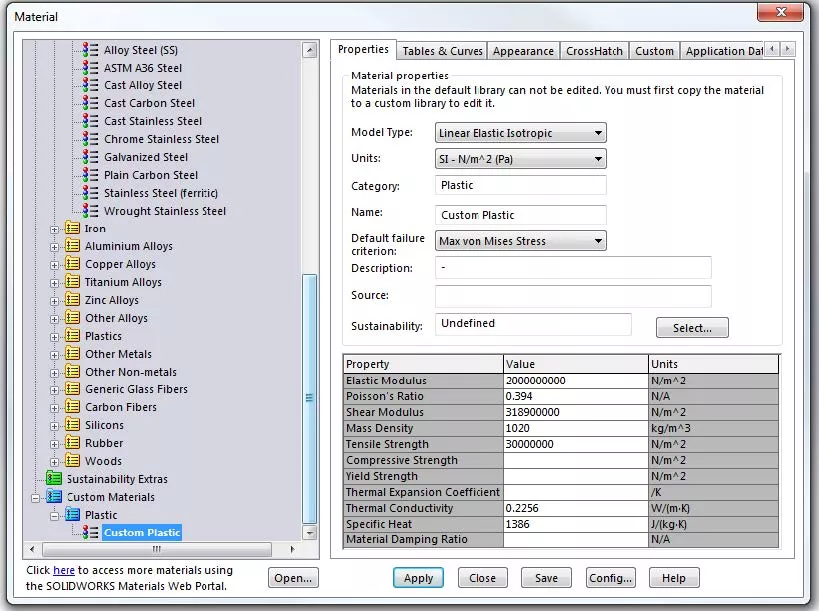SOLIDWORKS Simulation Material Properties
SOLIDWORKS Simulation uses material properties as the foundation to study designs. The default SOLIDWORKS material has many pre-defined material properties; however, users may need to define some of the material properties of default and custom materials before running a particular simulation study. For example, you may find that Mass Density and Yield Strength are pre-populated in a specific material but Specific Heat and Thermal Conductivity are not. This article defines the custom material properties and the studies they are used in.
Material Properties Dialogue Box
You can create and edit custom materials, libraries, and favorites from the materials dialogue box.

Elastic Modulus
The Elastic Modulus (Young’s Modulus) is the ratio of stress versus strain in the X, Y, or Z directions. Elastic Moduli are used in static, nonlinear, frequency, dynamic, and buckling analyses.
Poisson's Ratio
Poisson’s Ratio is the negative ratio between transverse and axial strain. Poisson’s ratios are dimensionless quantities. For isotropic materials, the Poisson’s ratios in all planes are equal. Poisson ratios are used in static, nonlinear, frequency, dynamic, and buckling.
Shear Modulus
Shear Modulus (Modulus of Rigidity) is the ratio of shear stress to shear strain Shear Moduli are used in static, nonlinear, frequency, dynamic, and buckling analyses.
Mass Density
Mass Density is used in static, nonlinear, frequency, dynamic, buckling, and thermal analyses. Static and buckling analyses use this property only if you define body forces (gravity and/or centrifugal).
Tensile Strength
Tensile Strength is the maximum that a material can withstand before stretching or breaking. Tensile Strength is used in pin bolt safety, fatigue, costing, factor of safety, linear static analysis, von Mises stress, Mohr-coulomb stress.
Compressive Strength
Compressive Strength is the capacity of a material or structure to withstand loads reducing size. Compressive Strength is used in factor of safety, maximum von Mises, maximum shear stress, Mohr-Coulomb stress, Maximum Normal stress, Tsai-Hill Criterion, Tsai-Wu Criterion, max stress.
Yield Strength
Yield Strength is the point at which the material will start to deform plastically. Yield Strength is used in pin bolt safety, fatigue, costing, factor of safety, linear static analysis, von Mises stress, Mohr-coulomb stress.
Thermal Expansion Coefficient
The Coefficient of Thermal Expansion is defined as the change in length per unit length per one degree change in temperature. Coefficients of thermal expansion are used in static, frequency, and buckling analyses if thermal loading is used. Frequency analysis uses this property only if you consider the effect of loads on the frequencies (in-plane loading).
Thermal Conductivity
Thermal Conductivity is the efficiency in which material transfers heat energy by conduction. It is defined as the rate of heat transfer through a unit thickness of the material per unit temperature difference. The units of thermal conductivity are Btu/in sec oF in the English system and W/m K in the SI system. Thermal conductivity is used in steady state and transient thermal analyses.
Specific Heat
Specific Heat of a material is the quantity of heat needed to raise the temperature of a unit mass of the material by one degree of temperature. The units of specific heat are Btu in/lbf oF in the English system and J/kg K in the SI system. This property is used in transient thermal analysis.
Material Damping Ratio
The material damping ratio allows the definition of damping as a material property. This property is used in dynamic analysis to calculate equivalent modal damping ratios.
Tangent Modulus
Tangent modulus is the slope of the stress-strain curve at any specified stress or strain. Below the proportional limit the tangent modulus is equivalent to Young's modulus. Above the proportional limit the tangent modulus varies with strain and is most accurately found from test data. This property is used in determining the plasticity in the von Mises stress criterion.
Hardening Factor
The Hardening Factor defines the proportion of kinematic and isotropic hardening. Used in the Tresca Model.
| Static | Elastic Modulus, Shear Modulus, Poisson’s Ratio Coefficient of Thermal Expansion, Mass Density, |
| Frequency | Elastic Modulus, Shear Modulus, Poisson’s Ratio Coefficient of Thermal Expansion, Mass Density, |
| Buckling | Elastic Modulus, Shear Modulus, Poisson’s Ratio Coefficient of Thermal Expansion, Mass Density, |
| Thermal | Coefficient of Thermal Expansion, Mass Density, Thermal Conductivity, Specific Heat |
| Design | Elastic Modulus, Shear Modulus, Poisson’s Ratio Coefficient of Thermal Expansion, Mass Density, |
| Factor of Safety | Tensile Strength, Yield Strength, Compressive Strength |
| NonLinear | Elastic Modulus, Shear Modulus, Poisson’s Ratio Coefficient of Thermal Expansion, Mass Density, |
| Linear Dynamic | Elastic Modulus, Shear Modulus, Poisson’s Ratio Coefficient of Thermal Expansion, Mass Density, Material Damping Ratio |
| Drop Tests | Elastic Modulus, Shear Modulus, Poisson’s Ratio Coefficient of Thermal Expansion, Mass Density, |
| Von Mises Criterion | Tangent Modulus, Yield Strength, Compressive Strength, Tensile Strength, |
| Mohr-coulomb Stress Criterion | Yield Strength, Compressive Strength, Tensile Strength, |
Need More Help?
If you or your company could use assistance with SOLIDWORKS Simulation, schedule an application mentoring session with a Simulation expert from GoEngineer.
Learn More About SOLIDWORKS Simulation
What's New SOLIDWORKS 2022: Simulation, Flow, & Plastics
SOLIDWORKS Motion Study Analysis and Setup Tutorial
Why Use Hex Elements in Your FEA?
Introduction to Validation Equations in SOLIDWORKS Simulation

About GoEngineer
GoEngineer delivers software, technology, and expertise that enable companies to unlock design innovation and deliver better products faster. With more than 40 years of experience and tens of thousands of customers in high tech, medical, machine design, energy and other industries, GoEngineer provides best-in-class design solutions from SOLIDWORKS CAD, Stratasys 3D printing, Creaform & Artec 3D scanning, CAMWorks, PLM, and more
Get our wide array of technical resources delivered right to your inbox.
Unsubscribe at any time.
